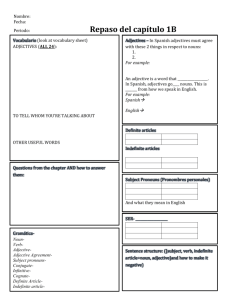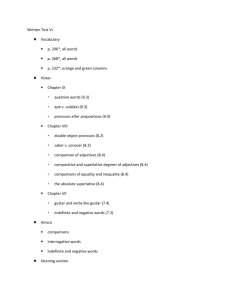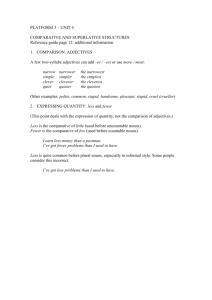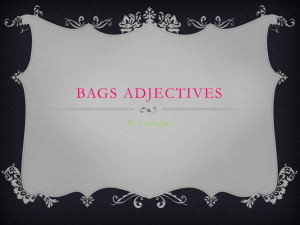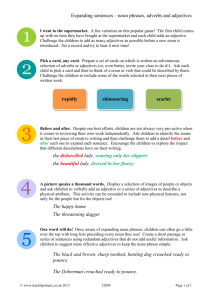1. Adjective - Cherokee County Schools
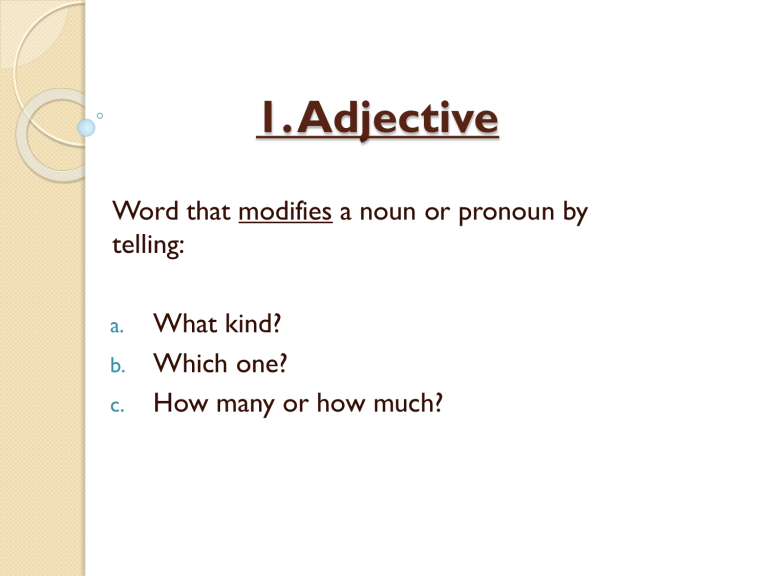
1. Adjective
Word that modifies a noun or pronoun by telling: a.
b.
c.
What kind?
Which one?
How many or how much?
2. To Modify (verb)
*To describe a word or to make its meaning more definite.
*To enhance
Suffix
1. able, ible
2. al
3. esque
4. ful
5. ic, ical
6. ious, ous
7. ish
8. ive
9. less
10. y
3. Adjective Suffixes
Example Meaning
Capable of being
Pertaining to
Reminiscent of
Notable for
Pertaining to
Characterized by
Having the quality of
Having the nature of
Without
Characterized by
Your Turn
4.
5.
1.
2.
3.
Angry students boycotted the expensive cafeteria.
Fifteen horses pranced in the Memorial
Day parade.
Some cars can go three hundred miles on a full tank of gas.
A big, yellow dog barred my way.
The school bus was late again.
4. Demonstrative and
Indefinite Adjectives a.
Demonstratives (4) – this, that, these, those b. Indefinite (13) – all, any, both, each, either, everything, few, many, most, one, several, some, something, AND ALL NUMBERS!
c. When these words are used alone, they are pronouns, but are adjectives when they modify nouns or pronouns.
d. Ex: Let’s take these pictures home to show Sally.
f. Did my dog eat that slipper or this one?
h. Most students studied really hard for that test.
5. Nouns Used as Adjectives
When a noun modifies another noun or pronoun, it is considered an adjective.
Ex: chocolate pie
Ex: basketball practice
Ex: school bus
*
A, an, and the
6. Articles
*The most commonly used adjectives in all the world.
*Articles always precede nouns.
Definite Article
*“the”
*Indicates a specific item
*Ex: the perennial, the dilemma the preamble, the rift the taunt, the catalyst
Indefinite Articles
*”a” and “an”
*indicates a general nonspecific item
*”a” – used before a noun beginning with a consonant sound.
*Ex: a jeer, a marauder
*“an” – used before a noun beginning with a vowel or vowel sound.
*Ex: an alien, an altercation
7. Proper Adjectives a.
Formed from a proper noun.
b.
Always capitalized.
c.
Ex: Italian leather, Darwinian theory,
Asian food
8. Adjectives of Comparison b.
c.
a.
Positive Form
Comparative Form
Superlative Form
8a. Positive Form – the base form of an adjective
1.
2.
3.
Does not show a level of comparison at all.
Used to show only that a quality exists.
Ex: fun, small, exact, crazy
8b. Comparative Form – form used to compare two things
2.
3.
1.
4.
For almost all adjectives of one syllable, form the comparative by adding –er to the end of the word.
Ex: taller, louder, wetter, nicer
For adjectives of more than two syllables, form the comparison usually by adding the word
“more” in front of the adjective.
Ex: more funny, more outrageous, more likable
8c. Superlative Form – used to compare more than two things
1.
For almost all one syllable adjectives, form the superlative by adding –est to the end of the word.
2.
Ex: deepest, coldest, saddest
8c. Superlative Form – used to compare more than two things
3. For adjectives of more than two syllables, form the superlative usually by adding the word “most” in front of the adjective.
4. Ex: most beautiful, most resentful
Positive
1. soft
2.
3. poisonous
4.
5. reasonable
6. arduous
Your Turn
Comparative Superlative more boring most mature

